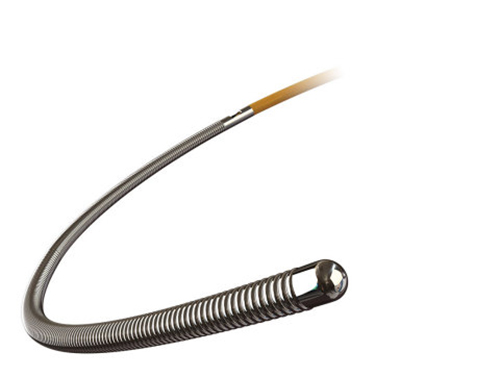St. Jude Medical, Inc. (NYSE:STJ), a global medical device company, today announced the U.S. clearance and launch of the company’s new PressureWire™ X Guidewire fractional flow reserve (FFR) measurement system. The latest generation of the pioneering PressureWire™ Guidewire system is designed to offer improved shapeability and better shape retention aimed at reducing vessel trauma, with the accuracy and simplicity physicians expect when treating patients during percutaneous coronary intervention (PCI), especially those with complex anatomies.

St. Jude Medical PressureWire™ X Guidewire (Photo: Business Wire)
A PCI procedure, or coronary angioplasty, is a non-surgical procedure designed to open coronary blood flow blockages and restore blood flow to the hearts of patients living with coronary artery disease (CAD)—the most common type of heart disease. PressureWire Guidewire FFR measurements are used by physicians to identify the severity of narrowings in the coronary arteries, which can result in more accurate diagnoses and improved treatment decisions for their patients. Although there are approximately 900,000 PCI procedures performed annually in the United States, only one in five of those are performed using FFR guidance.
“For years, clinical research has confirmed that fractional flow reserve is one of the most important tools available when assessing coronary lesions and making informed treatment decisions during percutaneous coronary intervention,” said Dr. Annapoorna Kini, the director of the cardiac cath lab and the director of the interventional fellowship program at Mount Sinai Medical Center New York, NY. “The improved design and shape retention of the new PressureWire X Guidewire tip allows us to perform FFR measurements in more tortuous anatomies.”
The use of FFR to optimize PCI is supported by strong evidence, and continues to be a topic of multiple clinical studies. In addition to launching the latest PressureWire Guidewire, St. Jude Medical has also launched the PRESSUREwire REGISTRY (Practical Evaluation of Fractional Flow Reserve (FFR) and its Association Alternate Indices During Routine Clinical Procedures), a multicenter clinical trial to determine the routine use of FFR measurement and clinical outcomes of FFR-guided PCI in patients with acute coronary syndrome (ACS), a major cause of global morbidity and mortality.
The PRESSUREwire REGISTRY will build upon clinical trials designed to assess the positive outcomes associated with FFR technology, such as the St. Jude Medical sponsored FAME (Fractional Flow Reserve (FFR) vs. Angiography in Multivessel Evaluation) trials, which found that St. Jude Medical PressureWire guidewire technology can improve patient outcomes over angiography alone in patients with CAD.
The St. Jude Medical FAME trial body of evidence also demonstrated reductions in the risk of death or heart attack in patients undergoing PCI, as well as reduced health care costs for patients whose treatment was guided by FFR technology. Primary outcome two-year data from the FAME 2 trial showed that in patients with at least one significant coronary blockage with an FFR value of at least .80, FFR-guided PCI plus medical therapy reduced urgent revascularization by 77 percent compared to medical therapy alone. In 2015, five-year data from the FAME study confirmed the sustained, long-term benefits of FFR-guided PCI over angiography-guided intervention.
“St. Jude Medical strives to provide physicians with fractional flow reserve pressure guidewire technology that is backed by ample clinical data and that matches the handling performance of conventional PCI guidewires,” said Dr. Mark Carlson, chief medical officer and vice president of global medical affairs at St. Jude Medical. “The new PressureWire X Guidewire shows our dedication to providing physicians with cost-effective, easy-to-use technologies that aid them in making the best treatment decisions for their patients. In turn, patients can have peace of mind knowing their physicians have more confidence in their readings.”




